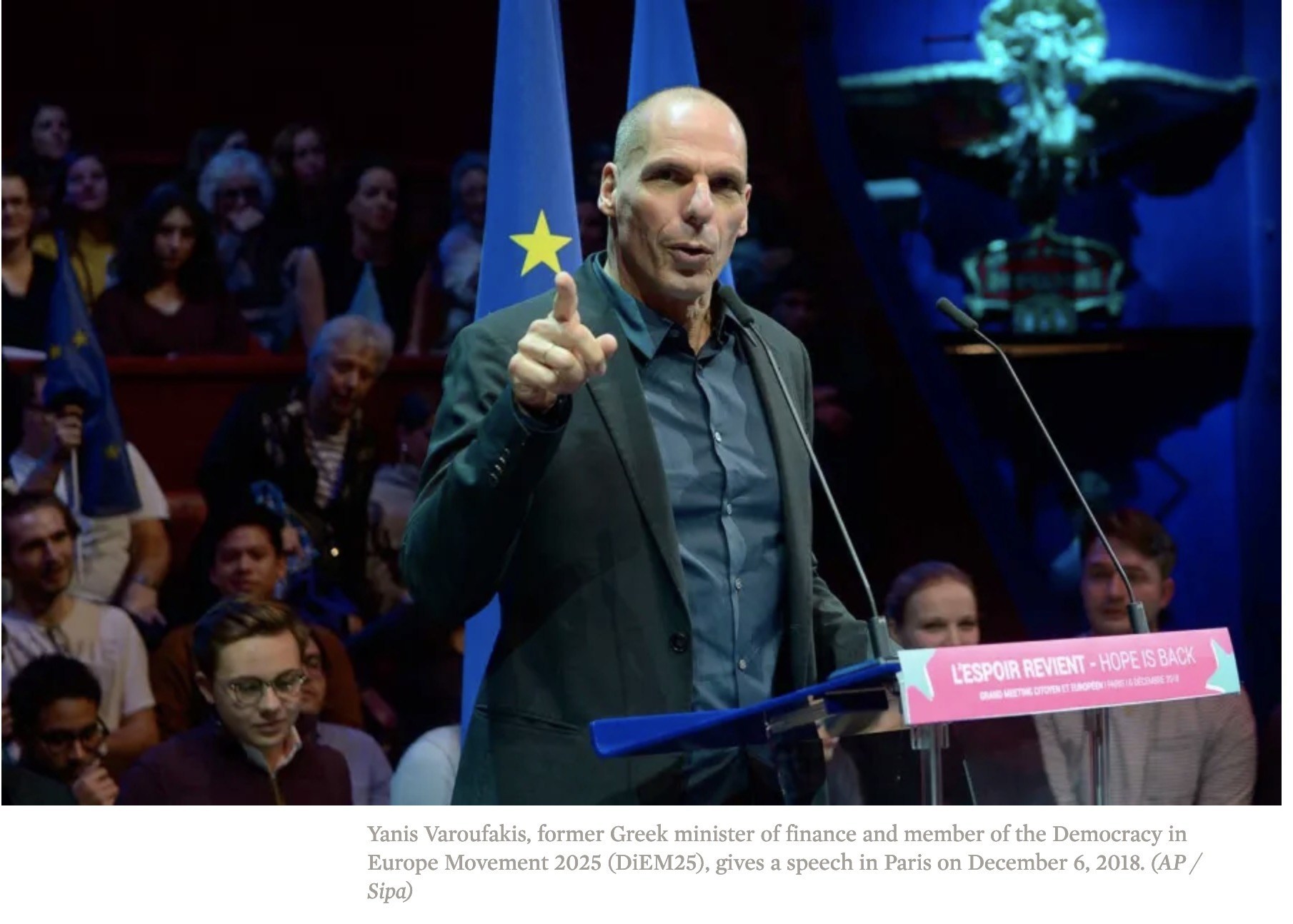The 2008 global financial crisis—the modern 1929 crash—set off a vicious chain reaction across Europe. By 2010 it had irreparably damaged the foundations of the eurozone, causing the establishment to bend its own rules and commit crimes against logic in order to bail out its banker friends. By 2013 the neoliberal ideology that had legitimized the EU’s oligarchic technocracy had plunged millions into misery, even through the enactment of official policies: socialism for the financiers and harsh austerity for the many. These policies were practiced as much by conservatives as by social democrats. By 2015 the surrender of the Syriza government in Greece had divided and disheartened the left, robbing Europe of
Topics:
Yanis Varoufakis considers the following as important: Campaigning, DiEM25, English, European Crisis, EUROPEAN SPRING, North America, The Nation
This could be interesting, too:
Yanis Varoufakis writes Jamie Galbraith on DiEM-TV’s ‘Another Now’ discussing the “criminal incapacity of the elites”
Yanis Varoufakis writes A chronicle of our BLEAK TWENTIES – Cambridge Union Online
Yanis Varoufakis writes European Oligarchy Has Banned Transfer of Wealth to Poor: Interviewed by Vijay Prashad
Yanis Varoufakis writes Have Merkel & Macron just announced a eurobond-funded godsend for the EU? DiEM25’s view


The 2008 global financial crisis—the modern 1929 crash—set off a vicious chain reaction across Europe. By 2010 it had irreparably damaged the foundations of the eurozone, causing the establishment to bend its own rules and commit crimes against logic in order to bail out its banker friends. By 2013 the neoliberal ideology that had legitimized the EU’s oligarchic technocracy had plunged millions into misery, even through the enactment of official policies: socialism for the financiers and harsh austerity for the many. These policies were practiced as much by conservatives as by social democrats. By 2015 the surrender of the Syriza government in Greece had divided and disheartened the left, robbing Europe of the short-lived hope that progressives’ rising up in the streets would alter the balance of power.
Since it was created in 2016, DiEM25 (Democracy in Europe Movement 2025) has resolved to make the most of this opportunity. First we prepared our program, the New Deal for Europe. Then we invited other movements and parties to help develop it and to create, together, our European Spring—the first transnational list pursuing a common policy agenda across Europe. Before discussing this project, the left must address two issues dividing and weakening progressives across Europe: borders and the EU.
BORDERS VS FREE MOVEMENT
Something very odd has been happening in recent years: Many on the left have come to view open borders as bad for the working class. Jean-Luc Mélenchon of La France Insoumise has said several times, “I’ve never been in favor of freedom of arrival.” In a speech on posted workers at the European Parliament in July 2016, he said migrants were “taking the bread out of the mouths” of French workers. He has since regretted this statement, though his views on the impact of migration on French wages have not changed.
This is not new. In 1907 Morris Hillquit, the founder of the Socialist Party of America, tabled a resolution to end “the willful importation of cheap foreign labor,” arguing that migrants were a “pool of unconscious strikebreakers.” What is new is that much of the left seems to have forgotten Lenin’s fierce reaction in 1915 to Hillquit’s call for curbs on migration: “We think that one cannot be internationalist and be at the same time in favor of such restrictions.… Such socialists are in reality jingoists.”
DiEM25 adopts Lenin’s apt analysis: Walls that curb the free movement of people and goods are a reactionary response to capitalism. The socialist response is to bring down the walls and allow capitalism to undermine itself, while we organize transnational resistance to capitalist exploitation everywhere. It is not migrants who steal the jobs of native workers but governmental austerity, which is part of the class war waged on behalf of the domestic bourgeoisie.
This is why we are adamant that xenophobia-lite must never be allowed to contaminate our agenda. As my friend Slavoj Žižek says, a leftist nationalism is a cruel and inane response to National Socialism. So DiEM25’s position on newcomers is that we refuse to differentiate between migrants and refugees. And we call upon Europe to #LetThemIn.
THE LEFT’S BEST STRATEGY
Comrades from across Europe call us utopian and say the EU cannot be reformed. They may well be right. So for argument’s sake, let us agree that the EU is unreformable. Is progressives’ best response to adopt Lexit (the left-wing campaign for the controlled disintegration of the EU)? Some of my happiest memories are of addressing large audiences in Germany in 2015, soon after Syriza’s surrender to Angela Merkel and the troika (the International Monetary Fund, European Central Bank, and European Commission). They were desperate to convey that what had been done to Greece had not been done in their name, the name of the German people. I remember how relieved they were on hearing the DiEM25 call to form one transnational movement, to unify, to fight together, to seize control of EU institutions—European Investment Bank (EIB), ECB etc—and redeploy them in the interests of all Europeans.
I still feel the elation of our German comrades on hearing our idea to run Greek candidates in Germany and German candidates in Greece to signify that our movement is transnational, that it intends to take over the neoliberal order’s institutions everywhere and at once, not to wreck them but to make them work for the many, in Brussels, Berlin, Athens, Paris. Everywhere.
Compare this with how they would have felt had I told them that the EU was unreformable and must be disbanded; that Greeks must fall back to their nation state and try to build socialism there, while Germans did the same. Once we succeeded, our delegations could meet to discuss collaboration between our newly sovereign progressive states. Our German comrades would undoubtedly have felt deflated, and returned home depressed, thinking that they would have to face the German establishment as Germans, not as part of a transnational movement.
If I am right, it does not matter whether the EU is or isn’t reformable, but it does matter that we put forward concrete proposals on what we would do with EU institutions. Not utopian proposals but complete descriptions of what we would do this week, next month, in the next year, under the existing rules and with the existing instruments—how we would reassign the role of the awful European Stability Mechanism, reorient the ECB’s quantitative easing, and finance immediately, and without new taxes, a green transition and campaign against poverty.
Why such a detailed agenda? To show voters that there is an alternative, even within the rules designed by the establishment to further the interests of the top 1 percent. No one expects the EU institutions to adopt our proposals, least of all us. All we want is for voters to see what could be done, instead of what is being done, so that they can see through the establishment without turning to the xenophobic right. This is the only way the left can escape its confines and build abroad progressive coalition.
TOWARD A DEMOCRATIC CONSTITUTION
DiEM25’s New Deal for Europe aims at this; it shows how the lives of the majority of people can be improved in the short run under existing rules and with the current institutions. And it maps out the transformation of these institutions while charting a constitutional assembly process that will, in the longer run, lead to a democratic European constitution to replace all existing treaties. And it demonstrates how the new mechanisms we will be introducing from day one can help us pick up the pieces if, despite our best efforts, the EU disintegrates.
This proposal requires no new taxes, builds on an existing European bond, and is fully legal under existing rules. The same applies to our other proposals, such as our Anti-Poverty Fund: We propose that the billions of profits of the European System of Central Banks (from assets purchased under the ECB’s quantitative easing or from the Target2 payment system) be used to provide every European under the poverty line with food, shelter, and energy security.
Another example is our plan to restructure the eurozone’s public debt: The ECB mediates between states and money markets to reduce their total debt burden, but without printing money or making Germany pay for, or guarantee, the public debt of the more indebted countries.
As these demonstrate, our New Deal combines technically competent plans, implementable under the EU’s existing framework, with a radical departure from austerity and the troika’s bailout logic. And it goes further by tabling new institutions that prepare for a post-capitalist European future.
A plan for post-capitalism proposes to partly socialize capital and the returns from automation: Big business corporations’ right to operate in the EU will be conditional on transferring a percentage of their shares to a new European Equity Fund. The dividends from these will then fund a Universal Basic Dividend (UBD) to be paid to each European citizen independently of other welfare payments or unemployment insurance.
Our proposals for reforming the euro are another radical change. Before getting bogged down in changing the charter of the ECB, we plan to create a public digital-payments platform in every eurozone country. Using their national tax office’s existing digital platform, taxpayers would have the opportunity to purchase digital tax credits, which they can use to pay one another or to pay future taxes at a substantial discount. These credits would be denominated in euros but transferable only between taxpayers within a single country, so would be impervious to sudden capital flight.
Our New Deal for Europe is a comprehensive plan for smartly redeploying existing institutions in the interests of the majority, planning for a radical, post-capitalist green future, and preparing to pick up the pieces if the EU collapses.
A EUROPEAN SPRING IS POSSIBLE
The left’s great foes are disunity and incoherence. Unity is crucial, but it should not be pursued at the expense of coherence. Consider the state of the European Left party: How can it appeal to voters this May when it is represented in Greece by a party that, in government, implements the harshest austerity in the history of capitalism on behalf of the troika, while many of its leading lights in countries like France and Germany are euroskeptic?
Well-meaning left-wing friends ask, “Why doesn’t DiEM25 join up with Jean-Luc Mélenchon’s La France Insoumise or Sahra Wagenknecht and Oskar Lafontaine’s Aufstehen movement in Germany? How can the left make a difference if you fail to unite?” The reason is simple: Our duty is to create unity on a foundation of radical, rational, and internationalist humanism. This means a common agenda for all Europeans and a radical policy of an Open Europe that recognizes borders as scars on the planet and newcomers as welcome. Nothing less will do.
Our bid for unity was based on a simple idea: DiEM25 invited all progressives to participate in the joint authorship of our New Deal for Europe on the basis of radical, humanist Europeanism. Our call was answered. Génération-s (France), Razem (Poland), Alternativet (Denmark), DemA (Italy), MeRA25 (Greece), Demokratie in Europa (Germany), Der Wandel (Austria), Actua (Spain), Livre (Portugal) joined in. More movements are joining now. Together we have formed the European Spring coalition that will run in May in the European Parliament election to push for our project.
Our message to Europe’s authoritarian establishment: We will resist you through a radical program that is technically more sophisticated than yours. Our message to the fascistic xenophobes: We will fight you everywhere. Our message to our comrades of the European left: You can expect unlimited solidarity from us, and one day our paths will converge in the service of a radical, transnational humanism.
